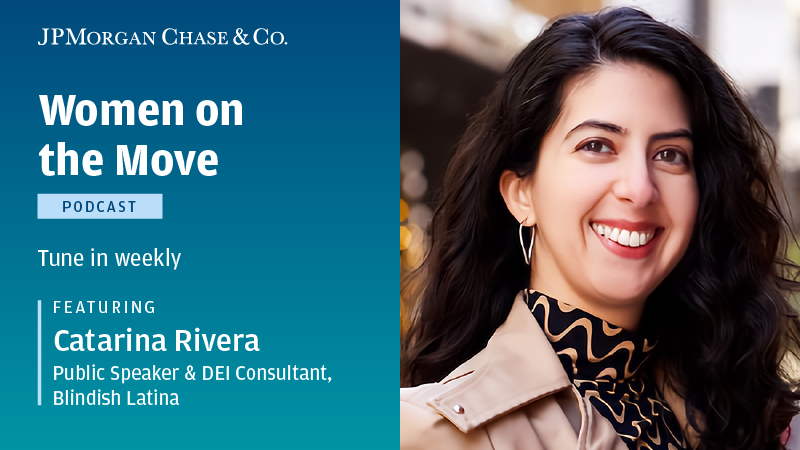Blindish Latina founder talks smashing disability stigmas and making workplaces more inclusive
Catarina Rivera is on a mission to let people know it’s not just OK to talk about disability—it’s imperative to take action. Here she sits down with Women on the Move host Sam Saperstein to discuss her journey as a person with a disability, a successful entrepreneur, a public speaker, and a DEI consultant.
Spreading awareness and smashing disability stigmas
Catarina tells Sam that she’s Cuban and Puerto Rican, and grew up in Maryland speaking Spanish as her first language. She started wearing hearing aids as a toddler and was diagnosed with progressive vision disability called Usher Syndrome at age 17. Using a white cane to help her navigate the world, she graduated from college and started her career with Teach for America as an elementary school teacher, teaching bilingual education. Later she moved into nutrition and public health, earning an MPH degree and transitioning into roles in nonprofit organizations throughout New York City, focusing on food justice work, community engagement, and capacity building.
In 2020, Catarina started her Instagram account @blindishlatina to share her story as a proud disabled Latina woman. “I started Blindish Latina because I wanted to see someone like me out there in the world,” she recalls. “I wanted to put myself out there as a professional, disabled Latina woman. I wanted to represent my story and create awareness among non-disabled people. It is said that knowing just one person of an identity group reduces prejudice and bias. So I wanted to be that disabled friend for people who don't have anyone in their life that's disabled.”
Catarina says her goal with Blindish Latina is to raise awareness and help everybody become a disability ally who knows how to take action on behalf of disability issues. “I want people to look at the world and realize that if they're nondisabled, their world is not my world,” she explains. “It's not the same world for disabled people and it's not okay to just leave it how it is. It needs to be accessible, whatever your capacity is. Whatever your scope of influence is, you can make a difference, whether that's at your place of worship or at work or in your family? How can you create more accessibility and inclusion for everybody?”
Inclusion in the workplace
As a DEI consultant, the workplace is one of Catarina’s prime focus. She’s invested in helping people understand that people with disabilities are invaluable additions to the workforce. For one, they have extensive life experience as problem solvers and innovators. “It takes a lot of energy to be disabled in a world that's not designed for us, not adapted to us,” she says.
Catarina has several simple suggestions for how to make the workplace more accessible. She tells Sam that her first goal is to make sure that a company is focusing on disability as part of diversity, equity, and inclusion work. Disability, she says, is absolutely a part of DEI, but it's not always seen that way, and it's not always prioritized. She notes that while there are more than a billion disabled people worldwide, 79 percent of disabled employees do not disclose their disabilities to HR. “There's a lot of people that are in the workforce and you don't know that they're disabled as well as another group of people who might not know themselves that they're disabled,” she ways. “All of this to say that in the workplace, disability needs to be talked about, there needs to be real inclusion built from the leadership standpoint.”
Often, she says, companies focus on accommodations—but that’s not enough. “That's actually the bare minimum,” she tells Sam. Catarina emphasizes that to her, disability inclusion is strong when an organization has thoughtfully built inclusion and accessibility into every stage of the employee and customer experience. “The work has been done and employees don't have to ask for everything that they need,” she notes. “This means building in a lot of flexibility and choice and designing with accessibility in mind from the beginning.” As an example, she says, organizations can offer different ways during the hiring process for candidates to demonstrate their abilities—not just verbal interviews, but also a live activity or actionable task.
She says she’s both hopeful for the future and has high expectations: “I would expect to see openly disabled executive leaders. I would expect there to be representation. I would also expect to see that accessibility is a mandatory part of all design processes, whether that's the design of an employee team-building experience or the design of a new product.”
Disclaimer: The speakers’ opinions belong to them and may differ from opinions of J.P. Morgan Chase & Co and its affiliates. Views presented on this podcast are those of the speakers; they are as of October 13th , 2022 and they may not materialize.”




